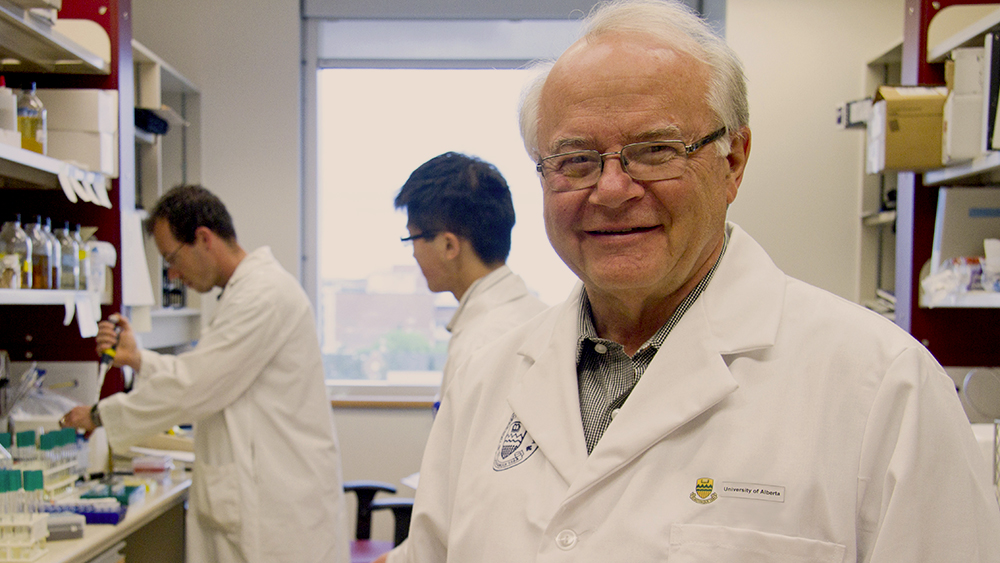
Lorne Tyrrell in the lab with students
For more than 30 years Lorne Tyrrell has been at the forefront of medical research in Canada. A world-renowned scientist for his work in the area of viral hepatitis, Tyrrell is among the upper echelon of Canada's scientific voices. Now his accomplishments have been recognized through one of Canada's most prestigious awards.
Tyrrell, a professor in the Faculty of Medicine & Dentistry's Department of Medical Microbiology & Immunology and the director of the Li Ka Shing Institute of Virology, has been named the winner of the 2015 Killam Prize for Health Sciences. Five Killam prizes of $100,000 are awarded annually by the Canada Council for the Arts' Killam Program, in support of scholars of exceptional ability engaged in research projects of outstanding merit in the areas of health sciences, engineering, natural sciences, social sciences and humanities. Tyrrell has been invited to a presentation ceremony at Rideau Hall in Ottawa on May 12.
"Lorne Tyrrell is a superstar in the field of virology who richly deserves this esteemed honour," says Richard Fedorak, dean of the Faculty of Medicine & Dentistry. "Throughout his long career Dr. Tyrrell has explored the boundaries of medical science. His work with viral hepatitis alone has immeasurably helped tens of thousands of people around the world. He continues to be a credit to both the University of Alberta and to our faculty."
The prize is the latest in a long list of honours given to Tyrrell. He was inducted into the Canadian Medical Hall of Fame in 2011 and is an Officer of the Order of Canada and a Fellow of the Royal Society of Canada. He has also been appointed to the Alberta Order of Excellence. In addition to the Killam Prize, Tyrrell has also just been granted a Lifetime Achievement award from the Association of Medical Microbiology and Infectious Disease Canada. He will receive that award on April 16 in Charlottetown, Prince Edward Island.
When he first entered the world of medicine, Tyrrell didn't see himself dedicating his life to research. His first instinct was to become a rural family physician, but early academic success as an undergraduate at the University of Alberta led to a scholarship that paid for MD/PhD training, which opened his eyes to a career in research.
"Once I started doing science I was hooked," says Tyrrell. "The excitement of research is that it takes some time, but once you get to the forefront of where knowledge is in your field, you realize that you're discovering new knowledge that no one else has ever seen, and that is thrilling."
Tyrrell credits both hard work and excellent collaborators and trainees over the years for the success he's enjoyed. His greatest achievement to date is his work with hepatitis B, a disease which annually kills more than 600,000 people worldwide. In 1986 he began seeing patients with chronic hepatitis B virus (HBV) and attempted to treat them with early antiviral drugs, with minimum success. But after finding inspiration in research published in the journal Cell that described the replication of HBV in the duck model, Tyrrell began a collaboration with then-U of A chemistry professor Morris Robins. That joint effort led to further collaborations with the pharmaceutical company Glaxo (now known as GlaxoSmithKline), which eventually led to the worldwide licensing of the drug, lamivudine, for the treatment of HBV in 1998. It was the first oral antiviral agent to be shown effective for the treatment of chronic HBV infection in patients and is now licensed in more than 200 countries.
Tyrrell has also seen great success in his work on the hepatitis C virus (HCV). In 2001, he, along with collaborators Norman Kneteman and David Mercer, developed a new form of lab model that could support HCV infection and replication for testing purposes. It was celebrated as a major breakthrough and has had a significant impact on the development of new antiviral agents for HCV. His laboratory at the Li Ka Shing Institute of Virology is now working on the development of a vaccine for HCV in collaboration with Michael Houghton, a professor holding a Canada Excellence Research Chair in the U of A's Department of Medical Microbiology & Immunology.
"This award to Dr. Tyrrell is so deserving because he has been at the forefront of global research throughout his career, and in addition, he is an exceptional leader, teacher, administrator and humanist," says Houghton. "Our work together on developing a vaccine against hepatitis C, along with our young talented researchers at the University of Alberta, is progressing well and we hope to be testing it in Canadians in two to three years' time."
Along with his ongoing work on a vaccine for HCV, Tyrrell is also committed to further developing Alberta's biotech industry in years to come. The future, he believes, is wide open, and filled with opportunities for new discovery at the U of A with the potential for translation. However, he says, discovery research remains essential as without it, there is little to translate.
"We have wonderful resources here. The buildings we have now are as good as you're going to find any place in the country. Our equipment is first rate as a result of the Canadian Foundation for Innovation. We have excellent graduate students. We have everything we need to see success. We also have tremendous support from the Government of Alberta to help to translate and commercialize discoveries to benefit patients.
"I really believe that we are in a golden age of research because of the convergence of the sciences and the development of new technologies that can be applied to understand disease processes-we are seeing wonderful things happening in medicine."